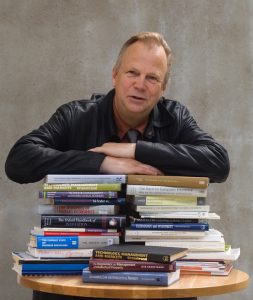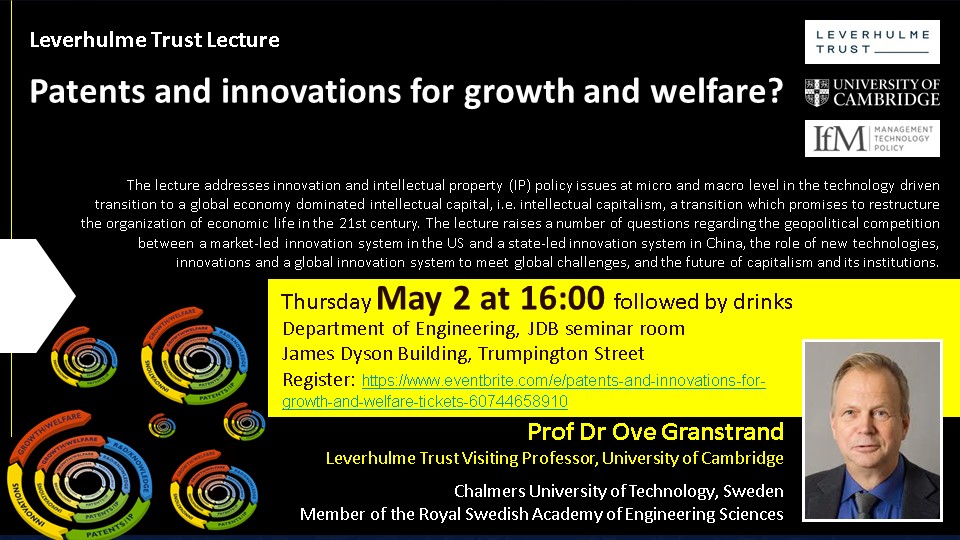First large study of IP strategies now available online
 One of the very first comprehensive empirical studies of IP strategies in large corporations is now available here. It was originally published as chapter 7 in Ove Granstrand’s widely recognized book from 1999: The Economics and Management of Intellectual Property. The study is based on the concept of a strategy ladder, enabling the integration of IP strategies laterally across main IPR types and vertically with technology and business strategies. After a survey of a number of advantages and disadvantages of patenting from a corporate perspective, the chapter reviews generic patent strategies and counterstrategies, litigation strategies, secrecy strategies and counterstrategies and other IPR strategies, that can be used jointly in multi-protection. The empirical survey and case studies mainly focus on IP strategies in large Japanese corporations and how they responded to US corporate patent and litigation strategies.
One of the very first comprehensive empirical studies of IP strategies in large corporations is now available here. It was originally published as chapter 7 in Ove Granstrand’s widely recognized book from 1999: The Economics and Management of Intellectual Property. The study is based on the concept of a strategy ladder, enabling the integration of IP strategies laterally across main IPR types and vertically with technology and business strategies. After a survey of a number of advantages and disadvantages of patenting from a corporate perspective, the chapter reviews generic patent strategies and counterstrategies, litigation strategies, secrecy strategies and counterstrategies and other IPR strategies, that can be used jointly in multi-protection. The empirical survey and case studies mainly focus on IP strategies in large Japanese corporations and how they responded to US corporate patent and litigation strategies.
Check out the study to gain further insights into IP strategies that are still relevant today, not the least in light of the evolving IP strategy game between US and China.

 In this new book Ove tries with a Swedish outlook to put innovation and IP in the current context of a global economy, driven as fast as ever by new technologies and innovations with new IP savvy players from Asia joining in the driver’s seat, notably China, building up large portfolios of IP resources along with financial and physical ones. International competition has again turned into competition between economic systems – market-led capitalism as in the US against state-led capitalism as in China. It will be highly interesting to see what roles innovation and IP will play in this geo-political game. More and most importantly however, is to see how innovations and IP can be used to meet all the technology-related global challenges. Will capitalist institutions like markets, entrepreneurship and property rights as we know them be sufficient? Probably not. Will they even be necessary? Most likely, but evolved. So at the same time as the intellectual properties in the capitalist economy evolve, we have to evolve the properties of intellectual capitalism.
In this new book Ove tries with a Swedish outlook to put innovation and IP in the current context of a global economy, driven as fast as ever by new technologies and innovations with new IP savvy players from Asia joining in the driver’s seat, notably China, building up large portfolios of IP resources along with financial and physical ones. International competition has again turned into competition between economic systems – market-led capitalism as in the US against state-led capitalism as in China. It will be highly interesting to see what roles innovation and IP will play in this geo-political game. More and most importantly however, is to see how innovations and IP can be used to meet all the technology-related global challenges. Will capitalist institutions like markets, entrepreneurship and property rights as we know them be sufficient? Probably not. Will they even be necessary? Most likely, but evolved. So at the same time as the intellectual properties in the capitalist economy evolve, we have to evolve the properties of intellectual capitalism.